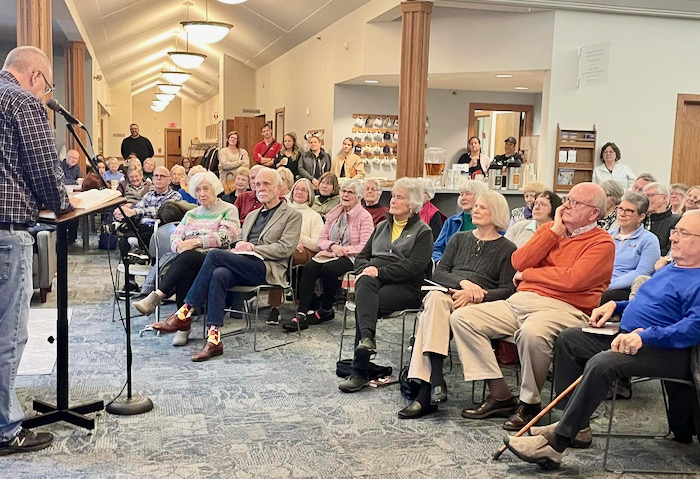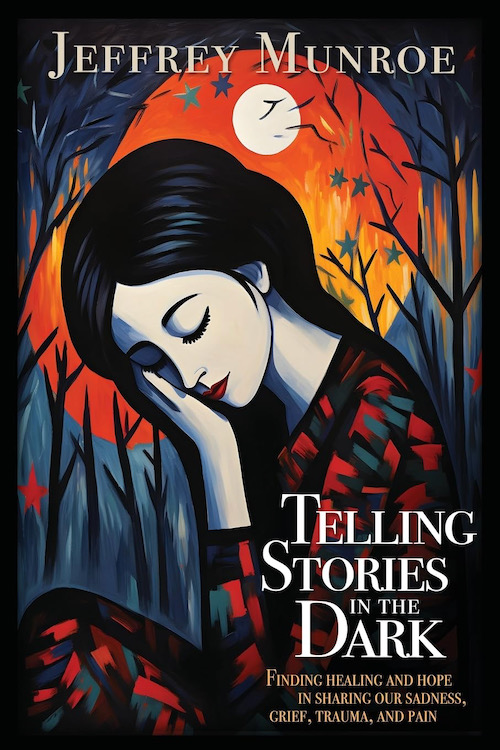
Jeffrey Munroe speaks to a crowd of more than 100 who filled a gathering space at Third Reformed Church in Holland, Michigan.
Editor’s Note: Even before Jeffrey Munroe’s book, Telling Stories in the Dark, launched nationally on January 30, he used some early pre-release copies of his book to host discussion groups. As it turned ut, many people were eager to talk about Jeffrey’s life-affirming message of finding resilience and hope—even in the face of deep and sometimes long-lasting trauma. After one such discussion, Jeffrey told us about a surprising, spontaneous response from a man whose story illustrates why such a book is needed.
We asked Jeffrey to write up that experience for us.
And here is that story …
By JEFFREY MUNROE
Author of Telling Stories in the Dark
HOLLAND, Michigan—In a discussion with early readers of my book, Telling Stories in the Dark, I asked if anyone could remember a time when they asked God why something painful had happened to them.
The man who volunteered to share was in his 90s.
“I had a baby brother who died,” he said with deep feeling. “I had been an only child and so wanted a brother. I remember riding in our car on the way to his funeral and sobbing out, ‘Why, God, why?’ ”
That experience was as vivid as the day it unfolded, he said. “In fact, I can take you to the exact place where this happened—it’s only a few miles from here.”
Our group sat in silence for a few moments, taking in his vivid recollection of this painful event.
Eventually, I asked, “How long ago was this?”
He did some math in his head and said, “88 years.”
After a pause, he said, “I tried to talk about it once—in this very room—about 30 years ago and couldn’t even get the words out.”
The conventional wisdom following a loss is that you are allowed a period of grief—at the most about 12 months, people seem to think—and then it’s time to get over it and move on with your life.
That is cruel.
Are we supposed to suppress our feelings and pretend our loved ones did not exist?
A while ago I came across this advice in a book I was reading, “You must let go of your grief. So far as it is possible, we must walk away from painful and destructive feelings. Simply that. Walk away.”
I reached for a pen and wrote “NO!!!” in large letters in the margin. I could not disagree more.
Grief is not a destructive feeling. It is not pathological. It is not a sign of weakness. It is not something to walk away from. It is something to embrace.
Opening ourselves to love means opening ourselves to grief.
As the philosopher Nicholas Wolterstorff put it to me in an interview for Telling Stories in the Dark, “If my child was worth loving when alive, he is worth grieving over when dead.”
Wolterstorff told me Western culture is fixated on “disowning grief.” The goal of grieving is not to get over it or put it behind you. The goal is to own it and take it into your being. Sure, with the passing of time the intensity of feelings may soften, but the wound created by loss never completely closes.
People sometimes speak of being “triggered,” while others react skeptically, feeling this indicates fragility. I am sympathetic to those who experience being triggered. All it may take is a few measures of music, a familiar scent, or a scene from a movie to transport you someplace else. Suddenly, the pain is acute.
There is nothing wrong with honoring those feelings.
What is wrong, and ultimately hurtful, is to pretend your feelings don’t exist.
How long will we live with loss and lament?
In the case of my friend, it’s been 88 years.
Now, I look to him as a role model.
.
.
Care to learn more?
‘When we tell our stories, others find their own healing and hope’
Because so many people are asking us about this new book, we asked early readers what questions they hope interviewers will ask Jeff as he embarks on a series of public outreach events. Here is that Q-and-A in which Jeff answers many of those questions.
And, please, don’t simply take our word for it about the value of this book: We also are pleased to share a link with our ReadTheSpirit readers this week to veteran journalist Bill Tammeus’s review of Jeff’s book in which Bill calls this “an enormously helpful book.” Bill headlined his review: Confronting trauma not with explanations but with love
Want to read a sample? This is the first book in our new Reformed Journal Books imprint and that online magazine—The Reformed Journal—has published their own column heralding the book’s official publication-date this week. The Journal editors chose to provide a brief excerpt from Jeff’s book, headlined: The Thing with Feathers, which was Emily Dickinson’s famous description of “hope.”

